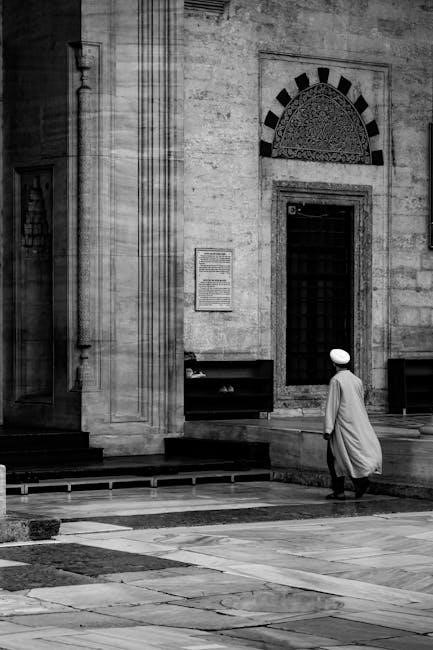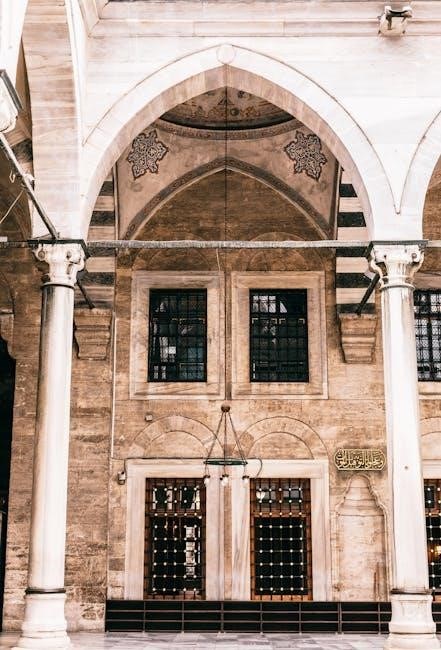Origin of Islam
Islam originated in Arabia around 610 CE when Prophet Muhammad received his first revelation in a cave near Mecca. This event marked the beginning of Islam as a religion, emphasizing the belief in one God and the Quran as Allah’s word.
The Life of Prophet Muhammad (570-632 AD)
Prophet Muhammad, the founder of Islam, was born in 570 AD in Mecca, Arabia. Orphaned at a young age, he was raised by his uncle Abu Talib. Known for his honesty and integrity, Muhammad worked as a merchant and earned the title “Al-Amin” (the trustworthy). At age 40, he began receiving revelations from Allah through the Angel Gabriel in a cave near Mecca, marking the start of his prophethood. These revelations, collected in the Quran, formed the foundation of Islam. Muhammad preached monotheism, social justice, and compassion, challenging the polytheistic practices of his time. Despite facing persecution, he and his followers migrated to Medina in 622 AD, an event known as the Hijra, which marks the beginning of the Islamic calendar. In Medina, Muhammad established a thriving community based on Islamic principles, resolving disputes, and promoting unity. His leadership extended beyond religion, influencing social, political, and cultural aspects of society. Muhammad passed away in 632 AD in Medina, leaving behind a legacy that shaped Islam and inspired millions worldwide. His life remains a model of moral excellence and divine guidance for Muslims.
The First Four Rightly-Guided Caliphs (632-661 AD)
The period following Prophet Muhammad’s death in 632 AD marked the reign of the first four Rightly-Guided Caliphs: Abu Bakr, Umar, Uthman, and Ali. This era, known as the Rashidun Caliphate, was characterized by the expansion of Islam and the consolidation of its teachings. Abu Bakr, the first caliph, focused on unifying Arabia and suppressing rebellions. Umar, who succeeded him, oversaw the rapid expansion of the Islamic Empire, conquering territories from the Byzantine and Sassanian empires. Uthman’s reign saw the compilation of the Quran into its standardized form, though his later years were marred by political unrest. Ali, the fourth caliph and Muhammad’s cousin, faced internal conflicts, including the First Fitna, which led to the division of the Muslim community. Despite challenges, the caliphs maintained a commitment to social justice and unity, establishing key administrative and legal frameworks that shaped Islamic governance. Their collective leadership laid the foundation for the Islamic Empire’s growth and the spread of its principles, making this period a defining chapter in Islamic history.
Expansion of Islam Beyond Arabia
The expansion of Islam beyond Arabia began shortly after the death of Prophet Muhammad, driven by the Rashidun and subsequent caliphates. Under the Umayyad Caliphate (661-750 AD), Islamic rule extended across North Africa, the Iberian Peninsula, and parts of Central Asia. The Abbasid Caliphate (750-1258 AD) further solidified this expansion, creating a vast empire that facilitated cultural and intellectual exchanges. Military campaigns, coupled with missionary efforts and trade, played pivotal roles in spreading Islam. The Umayyads established administrative systems that integrated diverse populations, while the Abbasids fostered a golden age of learning, attracting scholars from various regions. Cities like Baghdad and Cordoba became centers of knowledge, preserving and advancing Greek, Persian, and Roman wisdom. This period also saw the rise of Sufism, which emphasized spiritual dimensions of Islam, further enriching its appeal. The expansion was not solely military; it was also a cultural and religious phenomenon that reshaped the intellectual and spiritual landscape of the ancient world, leaving a lasting legacy in science, art, and philosophy.
The Umayyad and Abbasid Caliphates
The Umayyad Caliphate (661-750 AD) marked the first major dynasty after the Rashidun period, establishing Damascus as its capital. This era saw significant political and administrative reforms, including the creation of a centralized governance system. The Umayyads expanded Islamic territories, particularly in the Iberian Peninsula and Central Asia, but their rule was often marred by internal conflicts and accusations of deviating from Islamic ideals. The Abbasid Caliphate (750-1258 AD), which overthrew the Umayyads, shifted the capital to Baghdad and emphasized Islamic scholarship and cultural advancements. This period is often referred to as the “Golden Age of Islam,” during which scholars preserved and translated ancient texts, advancing fields like mathematics, medicine, and astronomy. The Abbasids also promoted religious unity and reforms, though their later years were marked by political fragmentation and external pressures. Both caliphates left a profound legacy in Islamic history, shaping its political, cultural, and religious identity for centuries to come.

The Golden Age of Islamic Civilization
The Golden Age of Islamic Civilization, spanning the 8th to the 13th century, was a period of extraordinary cultural, scientific, and philosophical growth. During this time, Islamic scholars and scientists made groundbreaking contributions to fields such as mathematics, astronomy, medicine, and philosophy. The city of Baghdad, under the Abbasid Caliphate, became a hub of learning and intellectual inquiry, attracting scholars from diverse backgrounds. The House of Wisdom, a renowned center of scholarship, played a pivotal role in preserving and translating ancient Greek, Persian, and Roman texts, which later influenced the Renaissance in Europe. Scholars like Al-Khwarizmi, Ibn Sina (Avicenna), and Al-Biruni revolutionized mathematics, medicine, and astronomy, respectively. Their works laid the foundation for modern scientific methodologies and remain influential to this day. This era also saw significant advancements in engineering, architecture, and the arts, with the development of intricate geometric patterns and calligraphy. The Golden Age not only enriched Islamic culture but also fostered a spirit of intellectual collaboration and innovation, shaping the course of human knowledge. Despite its eventual decline due to external invasions and internal conflicts, this period remains a testament to the transformative power of Islamic civilization.
The Spread of Islam in Africa, Asia, and Europe
The spread of Islam beyond Arabia began shortly after the death of Prophet Muhammad, driven by trade, diplomacy, and military campaigns. By the 8th century, Islam had reached North Africa, the Iberian Peninsula, and parts of Europe. Muslim traders and travelers introduced the religion to sub-Saharan Africa and Southeast Asia. The conquest of Persia in the 7th century facilitated the spread of Islam into Central Asia and India. Sufi mystics played a significant role in converting people in regions like Indonesia and the Balkans. Islamic rule in Spain during the Umayyad Caliphate brought cultural and religious exchange with Christian Europe. By the 13th century, Islam had established a strong presence in East Africa, while in Asia, it flourished under the Delhi Sultanate and the Mughal Empire. This period of expansion was marked by cultural blending, as Islamic traditions intertwined with local customs, creating diverse Muslim communities. The spread of Islam was not only through conquest but also through peaceful interactions, leaving a lasting legacy across three continents. This era shaped the global Islamic identity and its influence on world history.

The Crusades and Their Impact on Islamic History
The Crusades, a series of military campaigns initiated by Christian Europe between the late 11th and 13th centuries, had a profound impact on Islamic history. These campaigns were primarily aimed at recapturing the Holy Land from Muslim rule, leading to prolonged conflicts and shifting political landscapes. The First Crusade (1096–1099) resulted in the capture of Jerusalem in 1099, marking a traumatic event for the Muslim world. Muslim leaders, such as Saladin, emerged as heroes after recapturing Jerusalem in 1187, uniting various Islamic factions against the Crusaders. The Crusades disrupted trade and cultural exchange, fostering mistrust between Muslims and Christians. However, they also inadvertently facilitated the spread of Islamic knowledge and ideas to Europe, influencing fields like science, mathematics, and philosophy. The Crusades left a lasting legacy of tension but also highlighted the resilience and adaptability of Islamic societies. This period remains a significant chapter in the history of Islam, shaping its interactions with the Western world for centuries to come.

The Ottoman Empire and Its Legacy
The Ottoman Empire, one of the most influential Islamic empires in history, emerged in the late 13th century and reached its zenith in the 16th century under Suleiman the Magnificent. Originating in Anatolia, the Ottomans expanded their dominion across three continents, encompassing much of the Middle East, North Africa, and Eastern Europe. Their reign marked a golden age of Islamic civilization, characterized by advancements in law, architecture, and culture. The Ottomans established a sophisticated administrative system, including the millet system, which allowed religious minorities to govern themselves under Ottoman rule. The empire’s capital, Constantinople (modern Istanbul), became a center of learning, art, and trade, symbolizing the blend of Islamic and Byzantine heritage. The Ottomans also played a pivotal role in preserving and spreading Islamic knowledge, supporting scholars and institutions that contributed to the Islamic intellectual tradition. Despite its decline in the 19th and 20th centuries, the Ottoman Empire left a lasting legacy in politics, culture, and religion, shaping the modern Muslim world and its interactions with global powers. Its influence remains visible in the architecture, laws, and cultural practices of many nations today.

Islam in the Modern World
In the modern era, Islam has navigated significant transformations, adapting to global changes while maintaining its core principles. The 19th and 20th centuries saw the decline of traditional Islamic empires and the rise of nation-states, leading to a reevaluation of Islamic identity. Muslim-majority countries grappled with balancing Islamic traditions with modern governance, often resulting in diverse approaches to law, education, and politics. The influence of colonialism and post-colonialism shaped Muslim societies, as they sought to reclaim their cultural and religious heritage.
Islamic revivalism emerged as a response to secularism and Westernization, emphasizing a return to Islamic values and practices. Movements like the Muslim Brotherhood and other reformist groups sought to reconcile Islam with contemporary life, sparking debates on issues such as gender roles, human rights, and political participation.
Today, Islam is a global religion, with over 1.9 billion followers worldwide. The digital age has transformed how Muslims engage with their faith, from online education to social media influencing religious discourse. Challenges like extremism and Islamophobia persist, but so do efforts to promote interfaith dialogue and understanding. Muslims continue to play vital roles in shaping modern societies, contributing to science, art, and culture while navigating the complexities of a rapidly changing world.
The Future of Islam in a Globalized World
The future of Islam in a globalized world is shaped by the intersection of cultural, technological, and societal changes. As the world becomes increasingly interconnected, Islam faces both challenges and opportunities. Globalization has led to the spread of Islamic thought and practices across diverse cultures, fostering a more unified yet pluralistic Muslim identity. However, it also poses challenges, such as the rise of extremism and the clash of traditional values with modern lifestyles.
One of the key opportunities for Islam in the 21st century is the ability to engage in interfaith dialogue and promote peaceful coexistence. The digital age has enabled Muslims to share their perspectives and counter misinformation, fostering greater understanding. Additionally, Islamic values such as compassion, justice, and equality resonate with global efforts to address issues like poverty, climate change, and human rights.
The integration of Islamic principles with modern governance and education remains a critical focus. Muslim-majority countries are exploring ways to balance tradition with progress, ensuring that Islamic values inform policies without hindering development. As globalization continues, Islam’s ability to adapt and evolve while preserving its core teachings will determine its role in shaping a harmonious and inclusive world.


